8 Keyword Clustering Tools That Improve Your SEO
As you become more invested in your SEO goals, you might notice how much of a headache it can become to manage all of the keywords you’re trying to rank for. Fortunately, you don’t have to do all of it manually. Keyword clustering tools can do the heavy lifting for you.
In this article, we’re rounding up the eight best keyword clustering tools for semantic keyword grouping. These include:
- SE Ranking’s Keyword Grouping Tool: Categorizes keywords based on SERP results to assist with page optimization.
- Keyword Insights: Great if you’re looking for an all-encompassing and robust tool.
- Keyword Cupid: All data is sourced strictly from Google’s SERPs, which are the only unbiased sources of information, according to the tool.
- SEO Scout’s keyword grouper software: Groups related search terms based on n-gram word similarity.
- ClusterAI from ContentDistribution: Claims to give you the power to do three years of keyword research in minutes.
- Thruuu’s clustering tool: Research and group keywords at scale. Gain insights into what your competitors are up to.
- Surfer’s keyword research platform: A company that has gamified SEO and keyword research to make it more fun and interactive.
- ZenBrief: Boasts a simple and sleek user interface.
SE Ranking
Winner!
Keyword Insights
Keyword Cupid
No data
SEO Scout
No data
Content Distribution
No data
Thruuu
No data
Surfer SEO
Zenbrief
No data
SE Ranking
Winner!
Keyword Insights
Keyword Cupid
No data
SEO Scout
No data
Content Distribution
No data
Thruuu
No data
Surfer SEO
Zenbrief
No data
SE Ranking
Winner!
$129/month
Keyword Insights
$58/month or $7.99/1,000 credits
Keyword Cupid
$9.99 (2,000 keywords/report)
SEO Scout
Free tool
Content Distribution
$39/month (1,000 keywords)
Thruuu
Surfer SEO
Zenbrief
Free tool
SE Ranking
Winner!
- By the number of identical URL in the SERP (1-9)
- Based on the term with the highest search volume (soft method)
- Comparing keywords with each other (hardmethod)
- By country
- By language
- By regional differences
- By search engine
Keyword Insights
- By the number of identical URL in the SERP
- Around the term with the highest search volume
- Comparing all keywords with each other
Keyword Cupid
- By search engine
- By location
- By device
SEO Scout
- By language
Content Distribution
⛔
Thruuu
- By geographic location
- By search engine
- By language
- By device
Surfer SEO
- By intent
- By country
- By language
Zenbrief
⛔
SE Ranking
Winner!
Keyword Insights
Keyword Cupid
SEO Scout
Content Distribution
Thruuu
Surfer SEO
Zenbrief
SE Ranking
Winner!
Keyword Insights
Keyword Cupid
SEO Scout
Content Distribution
Thruuu
Surfer SEO
Zenbrief
SE Ranking
Winner!
- Keyword Rank Tracker
- Keyword Research
- Website Audit
- On-Page SEO Checker
- Competitive Research
- Backlink Checker and Monitor
- Content Marketing Module
- Local Marketing Module
Keyword Insights
- Keyword Discovery
- Search Intent
- Content Briefs
- AI Writer Assistant
Keyword Cupid
- Live Data Pulls
- Reporting
- Search Engine Targeting
- On-Page Suggestions
SEO Scout
- Keyword Explorer
- Rank Tracking
- SEO Performance reporting
- Keyword Cannibalization Tool
- Internal Link Analysis
Content Distribution
- SEO Consulting
Thruuu
- SERP Analyzer
- Content briefs
- Page Audit
Surfer SEO
- Content Editor
- Audit
- Serfer AI
Zenbrief
- Content Brief
- Content Editor
- Content Audit
SE Ranking
Winner!
- Scheduled PDF reports
- Extra User Seats
- Lead Generator
- Agency Catalog
- White Label
Keyword Insights
⛔
Keyword Cupid
- Linked accounts
- User seats
SEO Scout
⛔
Content Distribution
⛔
Thruuu
⛔
Surfer SEO
- White Label (paid add-on)
- API (paid add-on)
Zenbrief
⛔
SE Ranking
Winner!
✅ 14 days
Keyword Insights
✅ 4 days for $1
Keyword Cupid
✅ 7 day
SEO Scout
Free tool
Content Distribution
✅ 200 keywords free
Thruuu
✅ 500 free credits
Surfer SEO
⛔ 7-day Money-back Guarantee
Zenbrief
Free tool
SE Ranking
Winner!
Keyword Insights
Keyword Cupid
SEO Scout
Content Distribution
Thruuu
Surfer SEO
Zenbrief
No data
No data
No data
No data
No data
No data
No data
No data
No data
No data
$129/month
$58/month or $7.99/1,000 credits
$9.99 (2,000 keywords/report)
Free tool
$39/month (1,000 keywords)
Free tool
- By the number of identical URL in the SERP (1-9)
- Based on the term with the highest search volume (soft method)
- Comparing keywords with each other (hardmethod)
- By country
- By language
- By regional differences
- By search engine
- By the number of identical URL in the SERP
- Around the term with the highest search volume
- Comparing all keywords with each other
- By search engine
- By location
- By device
- By language
⛔
- By geographic location
- By search engine
- By language
- By device
- By intent
- By country
- By language
⛔
- Keyword Rank Tracker
- Keyword Research
- Website Audit
- On-Page SEO Checker
- Competitive Research
- Backlink Checker and Monitor
- Content Marketing Module
- Local Marketing Module
- Keyword Discovery
- Search Intent
- Content Briefs
- AI Writer Assistant
- Live Data Pulls
- Reporting
- Search Engine Targeting
- On-Page Suggestions
- Keyword Explorer
- Rank Tracking
- SEO Performance reporting
- Keyword Cannibalization Tool
- Internal Link Analysis
- SEO Consulting
- SERP Analyzer
- Content briefs
- Page Audit
- Content Editor
- Audit
- Serfer AI
- Content Brief
- Content Editor
- Content Audit
- Scheduled PDF reports
- Extra User Seats
- Lead Generator
- Agency Catalog
- White Label
⛔
- Linked accounts
- User seats
⛔
⛔
⛔
- White Label (paid add-on)
- API (paid add-on)
⛔
✅ 14 days
✅ 4 days for $1
✅ 7 day
Free tool
✅ 200 keywords free
✅ 500 free credits
⛔ 7-day Money-back Guarantee
Free tool
How we chose the keyword clustering tools in this list
Here’s how we appraised each keyword grouping software:
- Efficient keyword segmentation: Does it group keywords quickly and easily?
- Different grouping options: Does it give users control over how their keywords are segmented? Does it take location and language into account?
- Availability of search volume: Can users estimate search volumes for key terms and clusters?
- User interface quality: Is the tool customizable and simple to navigate?
- Pricing: Is it flexible and reasonable? Do users get what they pay for?
With that said, let’s take a look at the pros and cons of each keyword grouping tool in this list!
Top 8 keyword clustering tools
1. SE Ranking
Hands down, SE Ranking’s Keyword Grouping Tool is the best keyword clustering tool on our list. The platform, in general, offers all sorts of tools and features to help you manage your biggest SEO responsibilities. These include keyword research, content marketing, backlink tracking, and (you guessed it!) keyword grouping.
The Keyword Grouping Tool is a powerful way to keep your keywords organized and build web pages that make Google — and your users — happy.
If you don’t have a list of keywords to cluster, you can use SE Ranking’s Keyword Research tool to create them. Just enter your seed keyword and the tool will come up with thousands of different keyword ideas, including low search volume terms, questions, and more.
Efficient keyword segmentation
SE Ranking automatically buckets your keywords into categories based on the similarity of their SERP results. So, if certain keywords get similar results in Google’s top 10 SERPs, they’ll be put into the same bucket. This makes keyword segmentation a breeze.
Different grouping options
SE Ranking provides several customization methods for keyword grouping:
- You can group by accuracy. This represents the minimum number of URLs from the SERP that two keywords must share in order to be grouped together. The scale of accuracy ranges from 1 to 9. For example, if you set it to 5, your keywords must have 5 identical URLs in the SERP to be clustered together. A higher accuracy setting suggests more precise grouping.
- You can group by method. The scale goes from soft to hard. The soft grouping method means that the tools will compare all keywords to the query with the highest search volume. Hard grouping compares all keywords with each other. This can eliminate irrelevant keywords but may result in fewer, more niche groups.
- You can group by miscellaneous methods. Cluster your keywords by country, language, and/or regional differences.
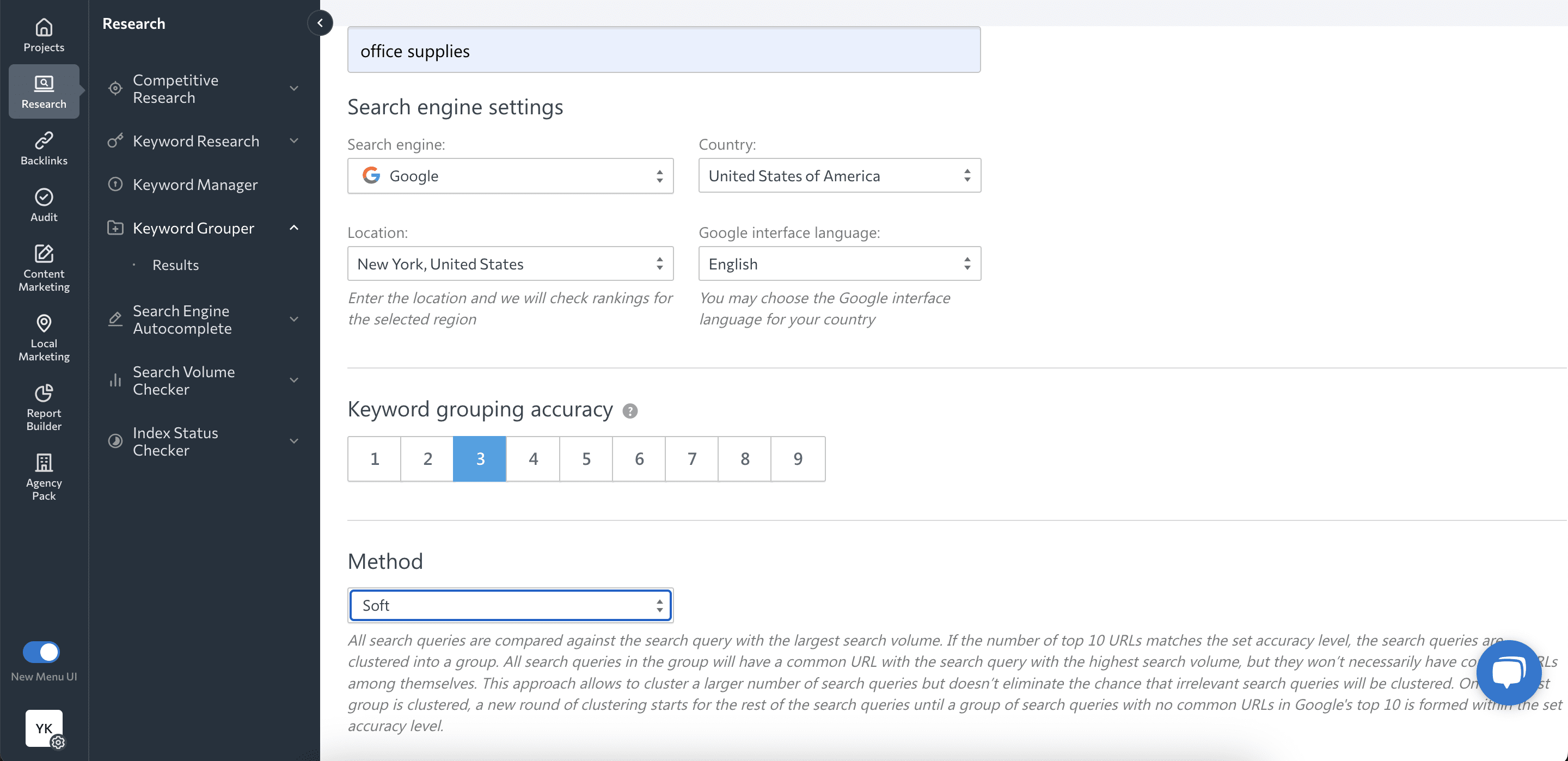
Availability of search volume
SE Ranking’s Keyword Grouping Tool also makes it easy to gather other important keyword information. For instance, you can opt to have the search volume displayed for all queries.
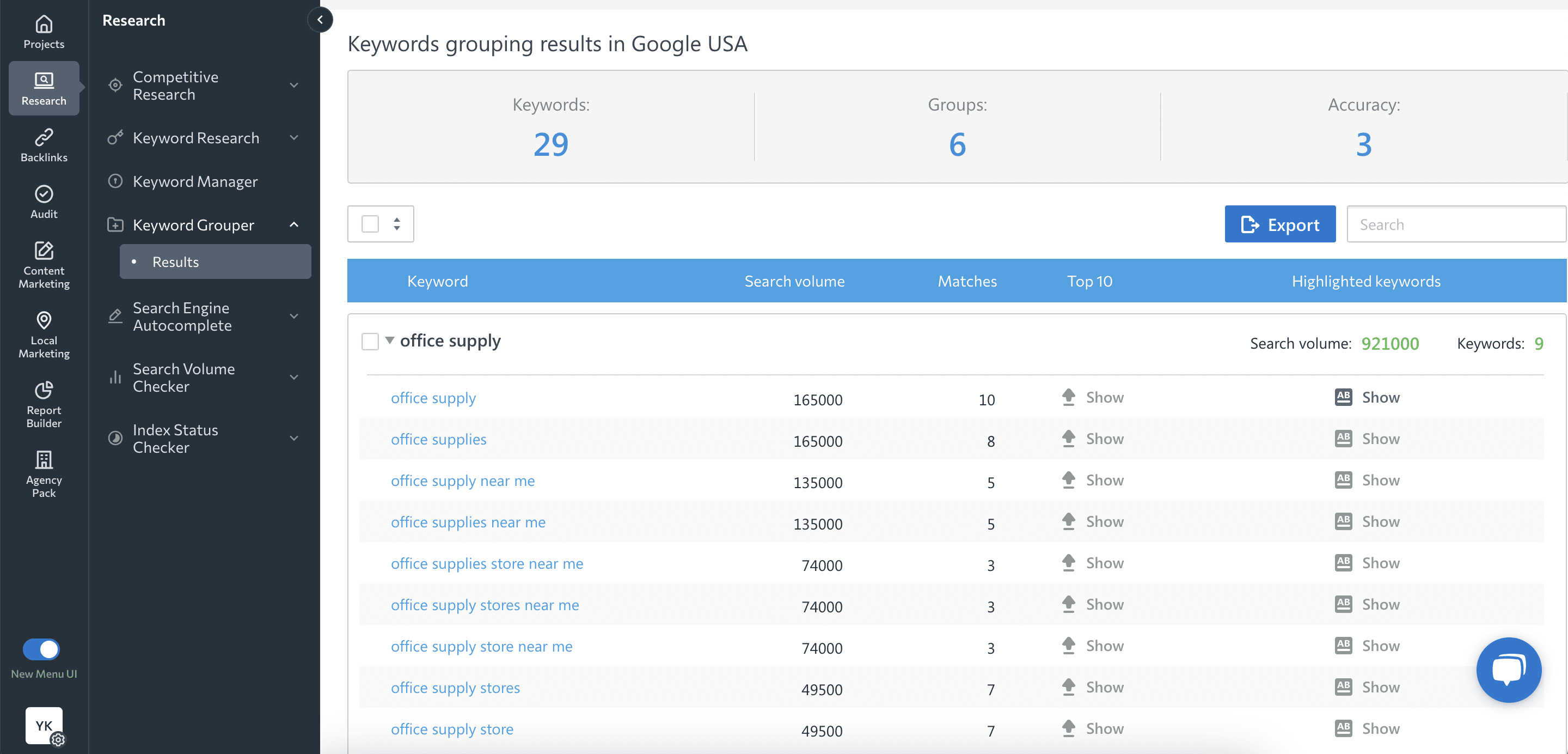
Alternatively, you can check search volume using SE Ranking’s Keyword Research Tool. Search volume data is updated regularly and is ungrouped even for similar search queries.
Other features
The tool’s feature set doesn’t end with search volume. For instance, you can get deeper insights into the SERP results by accessing a list of keywords highlighted in the snippets of Google’s top 10 results for each search query. This feature is entirely unique to SE Ranking.
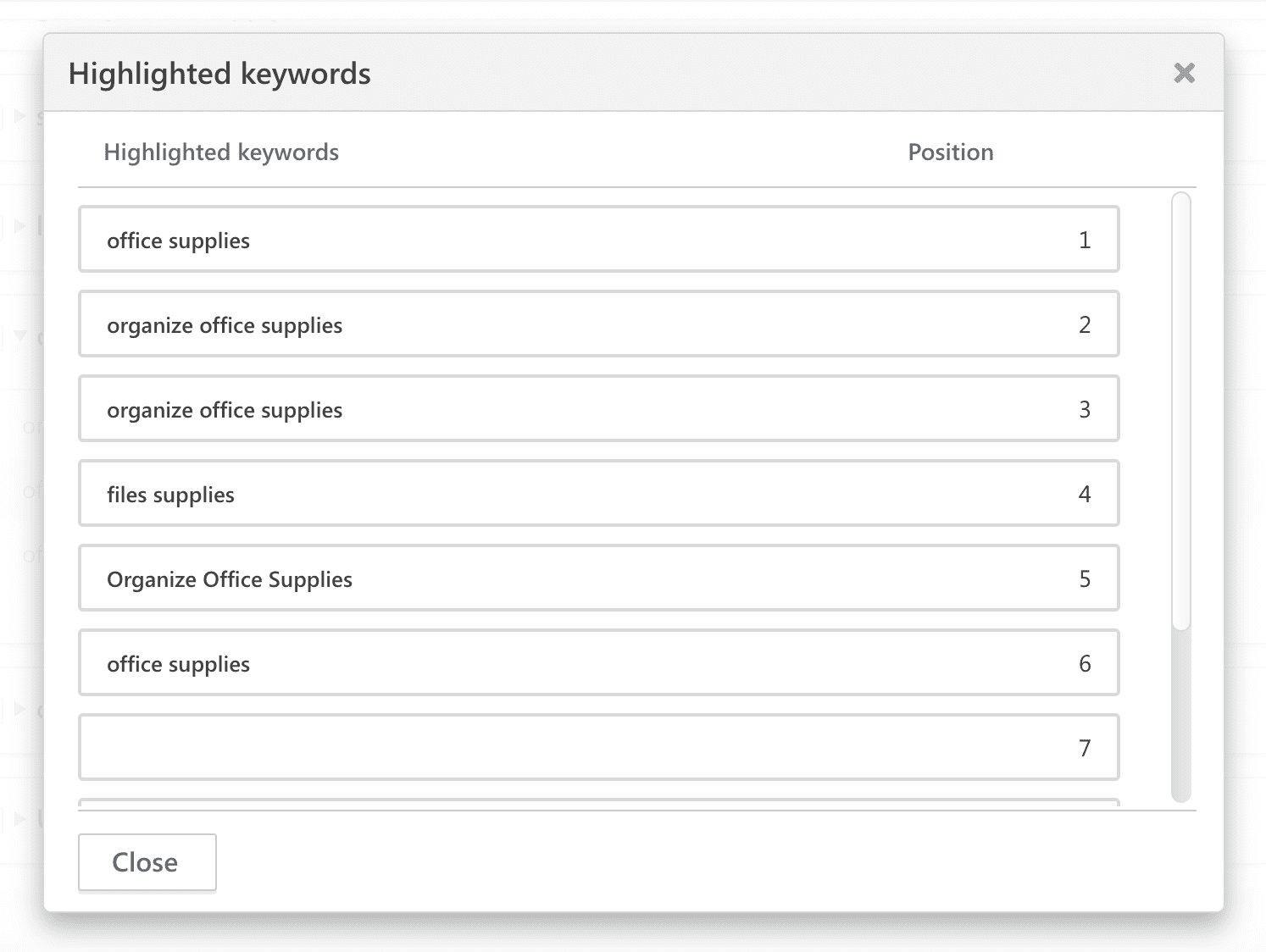
High-quality user interface
Whether you’re an agency, brand, or solopreneur, SE Ranking’s learning curve is as friendly as it comes. Customize several options to your liking and swiftly navigate its easy-to-use interface. All features, reporting or otherwise, can be fine-tuned to be as simple or as complex as you’d like.
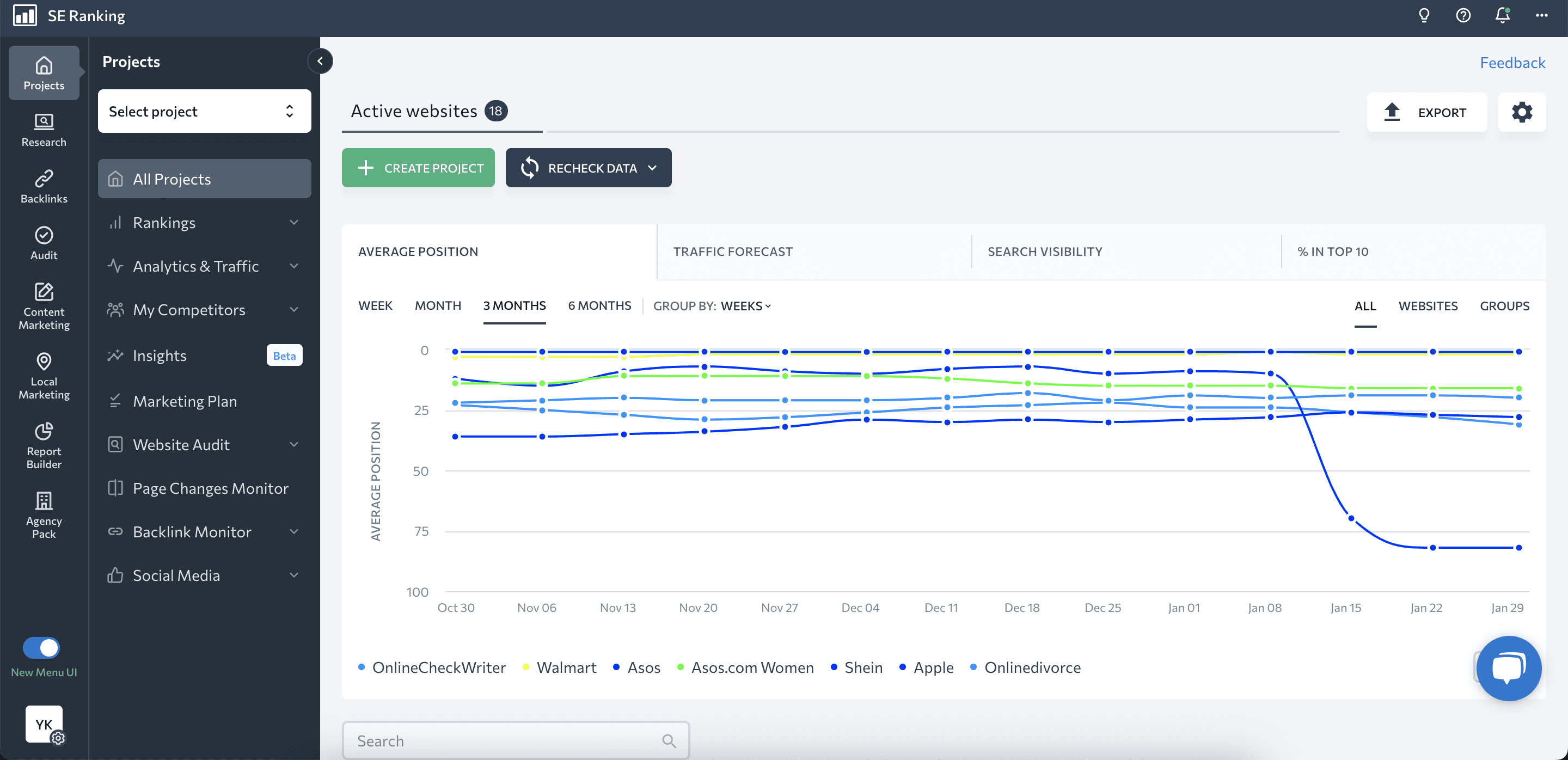
Pricing
SE Ranking has three main pricing plans:
- Core: $129/mo
- Growth: at $279/mo
- Enterprise: custom pricing
Keep in mind that you can get a 20% discount on any plan you choose if you opt to pay annually. Not only that, all of SE Ranking’s plans give you the flexibility to scale your features and data as your needs grow.
SE Ranking’s Keyword Clustering tool is only available to users with paid subscriptions and costs $0.004 per query. Checking the search volume for one query costs $0.005.
Pros and cons
SE Ranking is…
- Packed with all essential SEO tools, not just a single Keyword Grouper.
- Intuitive to use and navigate.
- Accurate in data and reduces errors in keyword clustering.
- Has flexible pricing options.
But…
- To access its Keyword Grouper, you must first buy a subscription.
The verdict
SE Ranking is one of the best SEO tools on the market. Keyword grouping makes up only a small fraction of its robust toolset. The entire platform will greatly reduce your workload while providing a nominal boost to your rankings and traffic.
2. Keyword Insights
Keyword Insights uses the power of AI to help you generate thousands of keyword ideas, create new content (or optimize existing content), and rise to the top of the SERP. And yes, keyword clustering is a major part of this process!
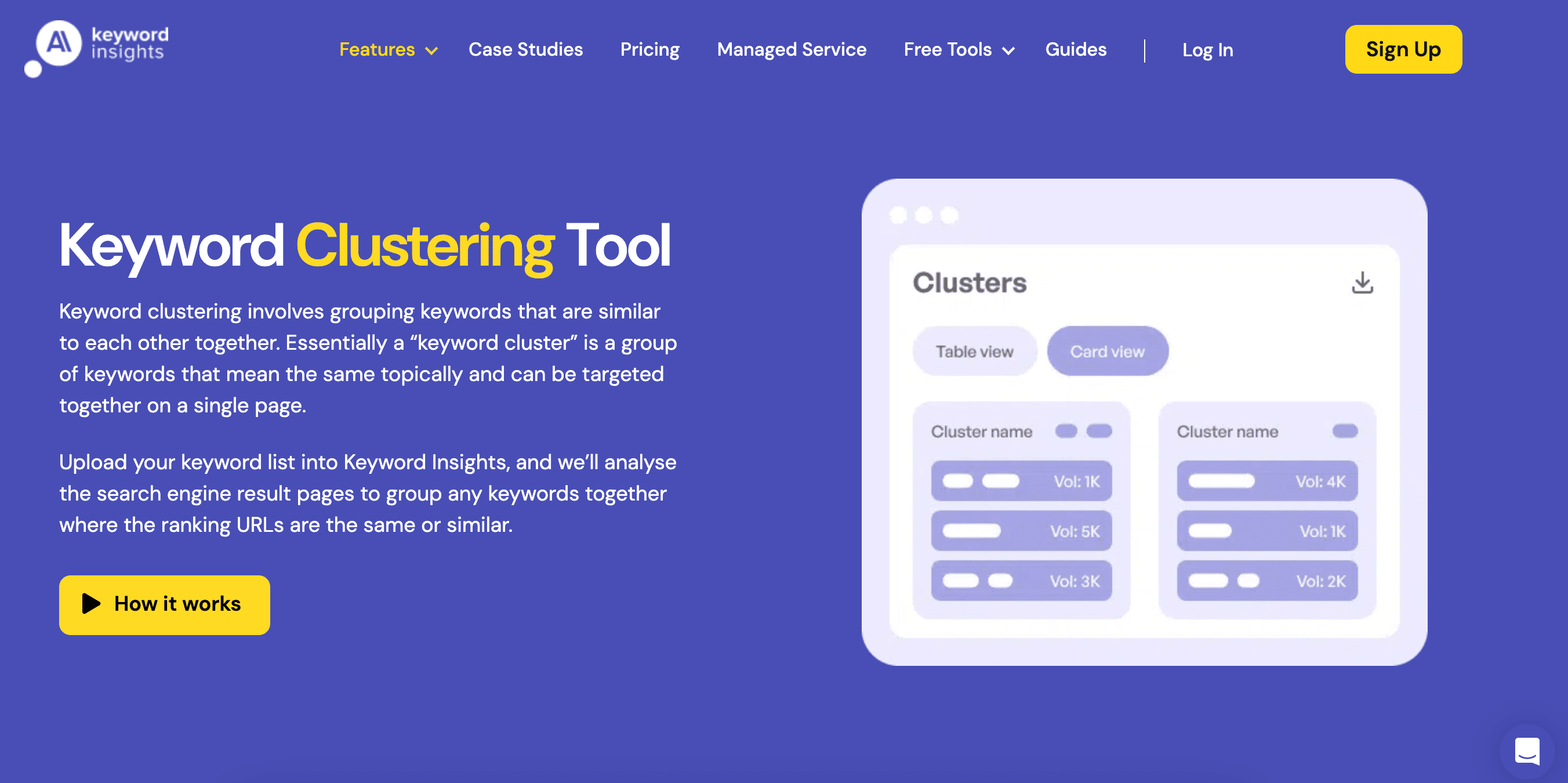
Efficient keyword segmentation
The tool lets you group keywords into clusters and leverage AI, either to create new content or to optimize existing content around your keywords. Keyword Insights uses 10 live search results to discover the number of URLs that the specified keywords have in common. It then groups these keywords according to their rankings in the SERP.
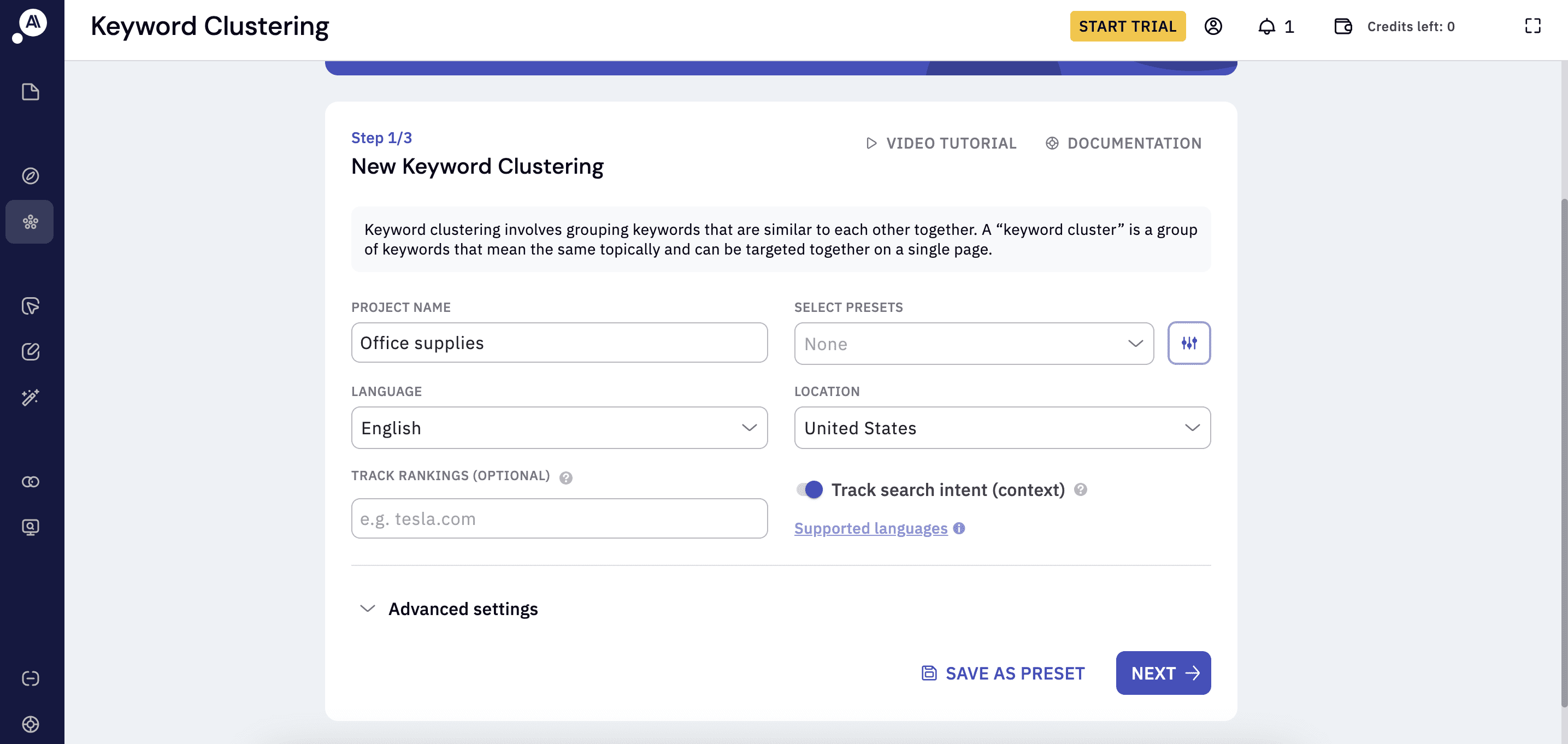
The tool also helps you identify content gaps and can determine if cannibalization is happening anywhere on your website. This helps you create content that looks great, is beautifully optimized, and contains no keyword stuffing errors.
Different grouping options
Keyword Insights uses live, country-specific data for each query. It allows you to visualize your data in several different ways. It will also give you an idea of how to break down keywords into separate sub-topics/pages in order to increase your site’s chances of ranking well.
The tool applies two clustering algorithms:
- The Centroid Clustering Algorithm: This groups keywords around the term with the highest search volume.
- The Agglomerative Clustering Algorithm: This compares all keywords with each other.
Both algorithms allow you to specify the number of shared URLs.
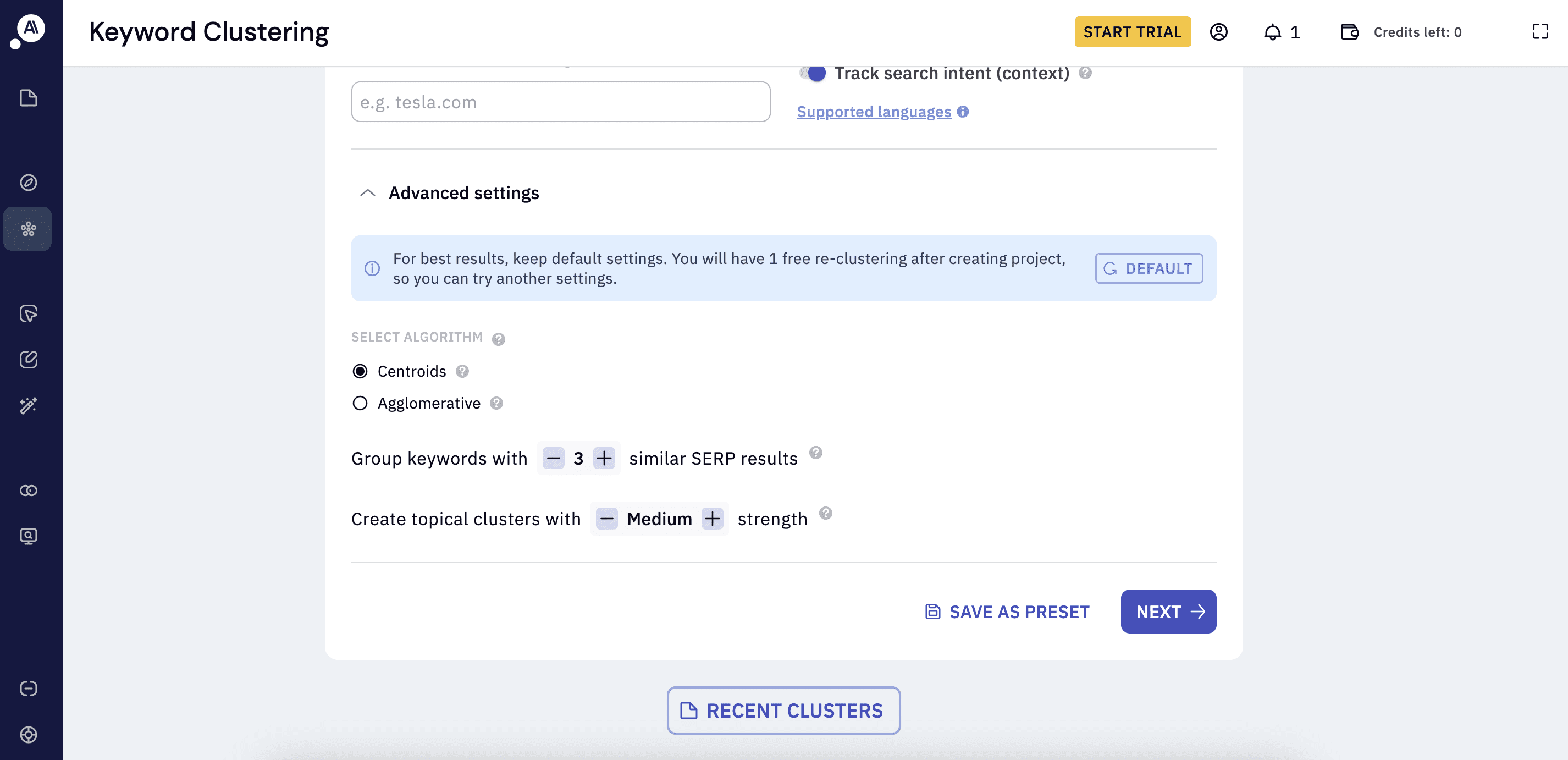
Availability of search volume
The tool uses search volume and a machine learning (ML) model to pick the keywords with the most articles in Google SERPs. This makes it even easier to identify which keywords to compete for.
User interface quality
Keyword Insights leaves room for customization: You can adjust the URL overlap and the type of clustering algorithm it’s using. It’s also possible to set the strictness level of the natural language processing (NLP) when forming topical cluster recommendations.
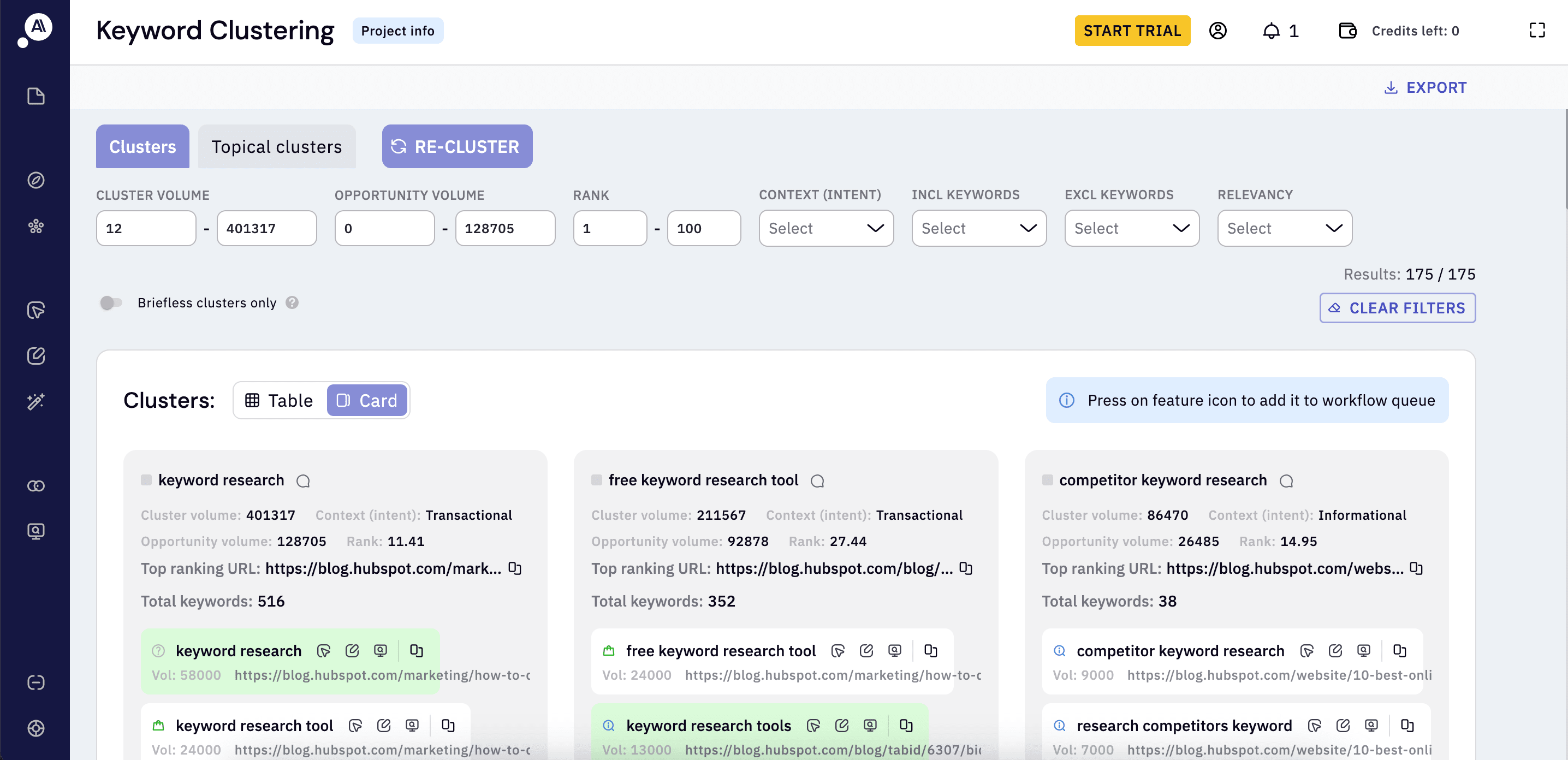
Pricing
You can give the four-day trial a go for $1. After that, there are three subscription plans: Basic, Professional, and Premium plans, priced at $58, $145, and $299 per month, respectively. This translates to $4.83, $4.00, and $2.99 for 1,000 keywords, respectively. You can also pay as you go, which costs $7.99 for 1,000 credits.
Pros and cons
Keyword insights is…
- All-inclusive and thorough.
- Customizable.
But…
- The cost can add up quickly.
- The cheaper plans might be too restrictive.
The verdict
This is a very extensive tool that goes well beyond keyword reporting, but tools that try to do everything tend to fall short. This tool might be a jack of all trades but it’s a master of none. And depending on how many keywords you need to analyze, it might not be the most cost-effective solution either. One smart first step is to get a rough idea of the volume of your keywords and what you need. For instance, the Basic plan offers only one user seat and no team sharing or reporting functionalities.
3. Keyword Cupid
Keyword Cupid uses neural network models to reverse engineer everything happening on Google. It does this live, removing the guesswork so you can make data-driven decisions.

Efficient keyword segmentation
When you put some of your desired keywords into Keyword Cupid, it spits out both topical clusters and related keywords that you can create pillar content around. This helps you develop siloed content and come up with potentially thousands of topic ideas in one go.
Different grouping options
The tool makes segmentation pretty simple. All you need to do is provide a list of keywords and separate them by commas. For instance, you can segment by search engine. Just use a map to confirm the location you’re looking at. Keyword Cupid will then scrape all SERPs relevant to that location. Additionally, you can target SERPs from mobile, desktop, and tablet devices.
Availability of search volume
Its reporting feature displays not only the search volume for every keyword but also the average difficulty, CPC, content length, meta keywords, H1s-H3s, links, images, and more.
User interface quality
The tool’s interactive mind map that comes with keyword results is also a really nice touch. However, the entire user interface is a tad clunky and a bit outdated. The reporting, while informative, is also somewhat barebones.

Pricing
Plans range from $9.99 a month to $499.99 a month. While the Starter plan is pretty affordable, its feature set is limited. For example, it doesn’t include geotargeting. You also only get 2,000 keywords per report. If you’re an SEO pro who needs more features, you’ll need the next plan up, which is about $50 per month.
Fortunately, Keyword Cupid never locks you into its subscriptions, and they will prorate you based on your usage.
Pros and cons
Keyword Cupid is…
- Beginner-friendly.
- Flexible with pricing.
But…
- It doesn’t offer much in terms of features and reporting.
- You might need to invest more money to get what you need.
The verdict
This is one of best the keyword grouping tools because it’s simpler and a great place to start, especially if you’re new to keyword research and SEO. However, if you’re looking for something more powerful or feature rich, you should probably go with one of the first two choices on this list.
4. SEO Scout
SEO Scout analyzes your site’s content, makes improvement suggestions, and guides you as you create new content. It uses your search console data and its own SEO crawler to find out what is and isn’t working for you. SEO Scout might be the best free keyword clustering tool for you if you’re looking for an easy start.
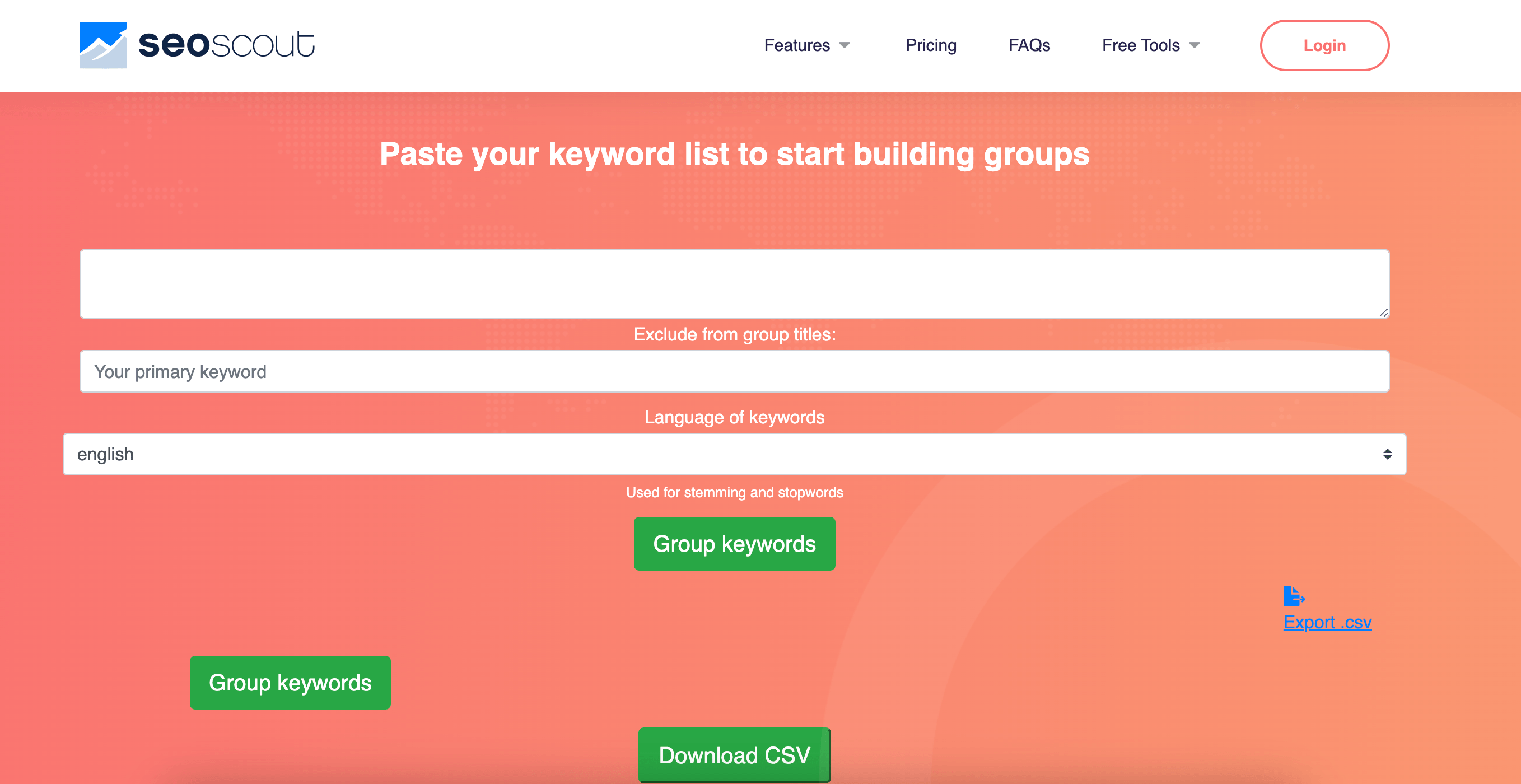
SEO Scout also offers paid plans.
Efficient keyword segmentation
SEO Scout begins by grouping similar keywords. This helps you get a general understanding of the topics and subtopics that your readers care about and are searching for. It also groups them by pulling FAQs from the “People also ask” feature, as well as from Google Suggest.
This makes it easier to identify short-tail keywords to create pillar content around, and long-tail keywords to create cluster content around.
Different grouping options
This is one area where SEO Scout falls short. You can only choose to group keywords by language, which means there’s a big void in terms of keyword organization by device, search engine, geographical region, and other parameters.
Availability of search volume
We tested the free version of SEO Scout… and it didn’t even work. However, after a little research, we learned that it only groups keywords, and that’s all. If you upgrade to the platform’s paid version, it looks like you’ll get more data.
User interface quality
There’s not much to this tool (which can be a good or bad thing), but it is very user friendly.
One thing we like about it is that you can easily exclude specific terms or topics from clusters.
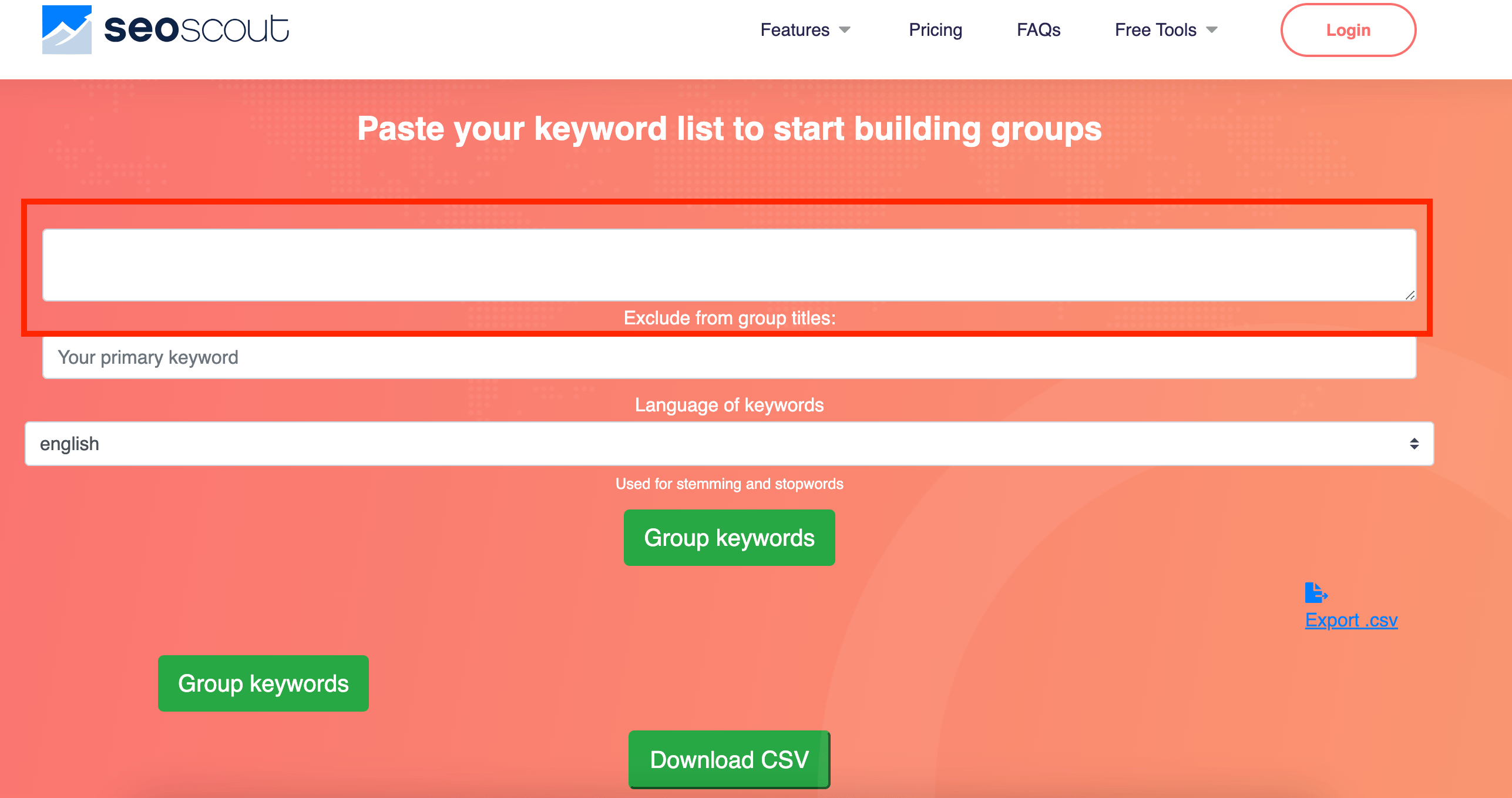
Pricing
SEO Scout doesn’t have a cheap paid plan available. It’s subscription packages range from $49 to $199 a month. The good news is that keyword grouping is a feature that comes with all of these plans.
Keep in mind that the cheaper plans have their limits. For example, the Starter plan allows you to track only three sites. This means that if you’re an agency, expect to pay for a bigger plan.
Pros and cons
SEO Scout is…
- Good for newbies.
- Free (with very limited features).
But…
- The free plan doesn’t go very far.
- The paid plans aren’t exactly cheap.
The verdict
If you want a free tool, SEO Scout is a good place to start, especially for keyword grouping. However, you will likely find (sooner rather than later) that the free tool has its limitations and upgrading becomes necessary. In that case, you’ll need to add a little more room to your budget. SEO Scout isn’t the cheapest on this list by a long shot.
5. ContentDistribution
ContentDistribution offers processes, systems, and templates to help you scale your content velocity in-house. So, it goes beyond SEO and looks more holistically at how you create content. ClusterAI from ContentDistribution claims that it can reduce time spent doing keyword research by 90%.
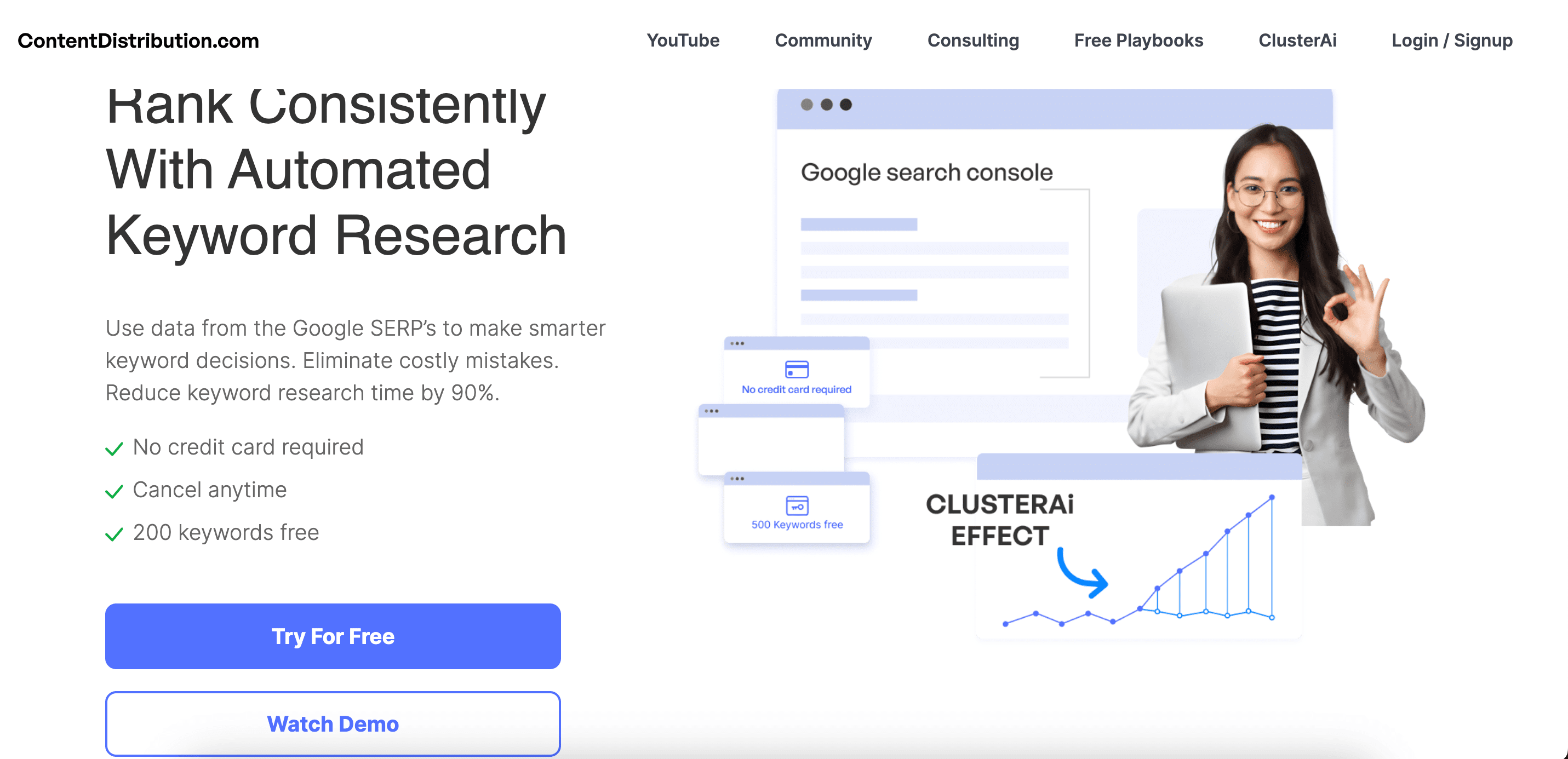
Efficient keyword segmentation
This SEO tool imports your keyword list (up to 25,000 words) manually. ClusterAI examines the first page results for each keyword. When it finds at least three pages ranking for a particular group of keywords, it will bucket them together.
So, if you’re trying to rank for a short-tail pillar keyword, ClusterAI can drum up thousands of potential ideas for cluster content and help you rank for it.
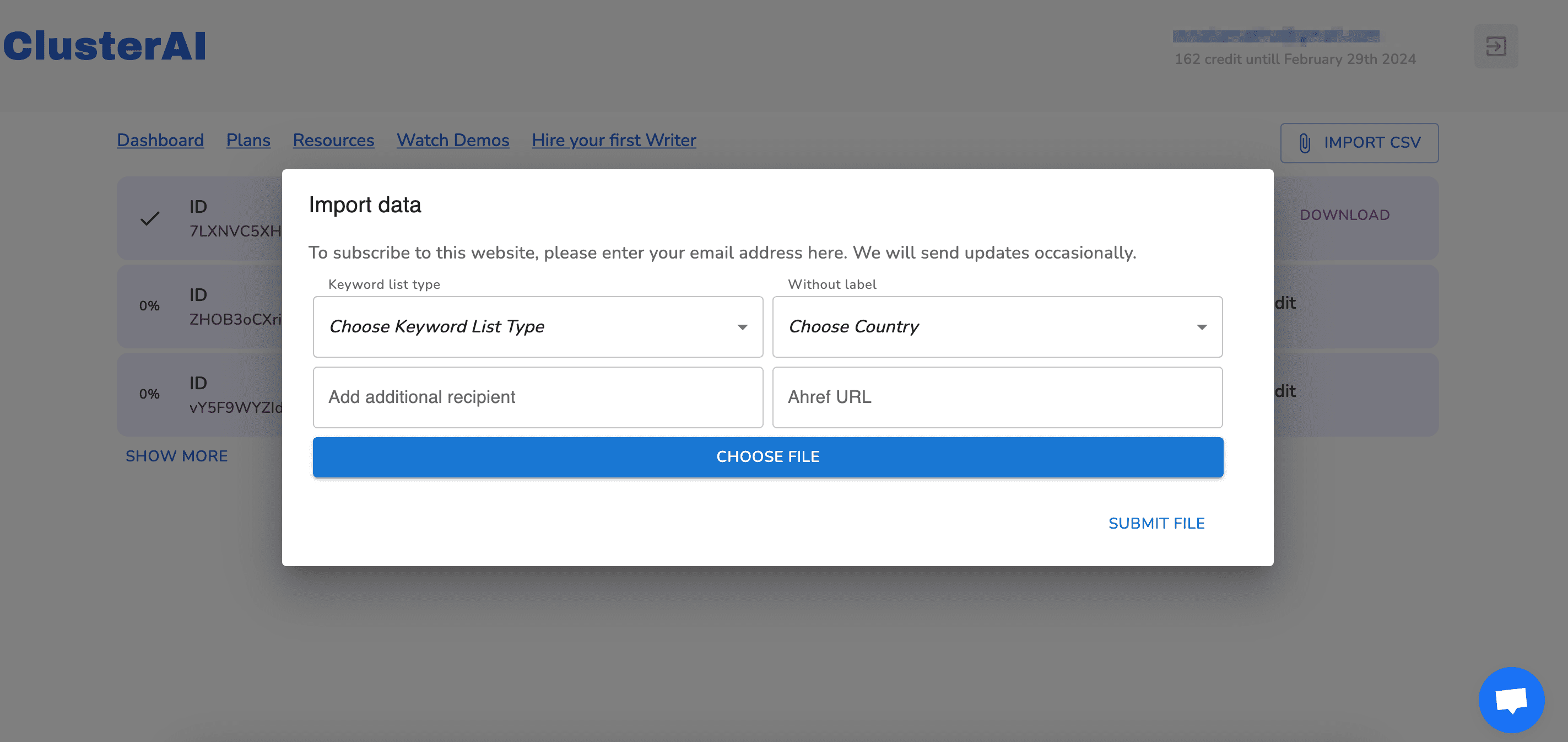
Different grouping options
ClusterAI doesn’t appear to offer any grouping options.
Availability of search volume
When you export results with ClusterAI, it gives you the monthly search volume, along with variations of the main keyword. You would then incorporate these into the page that focuses on that main keyword.
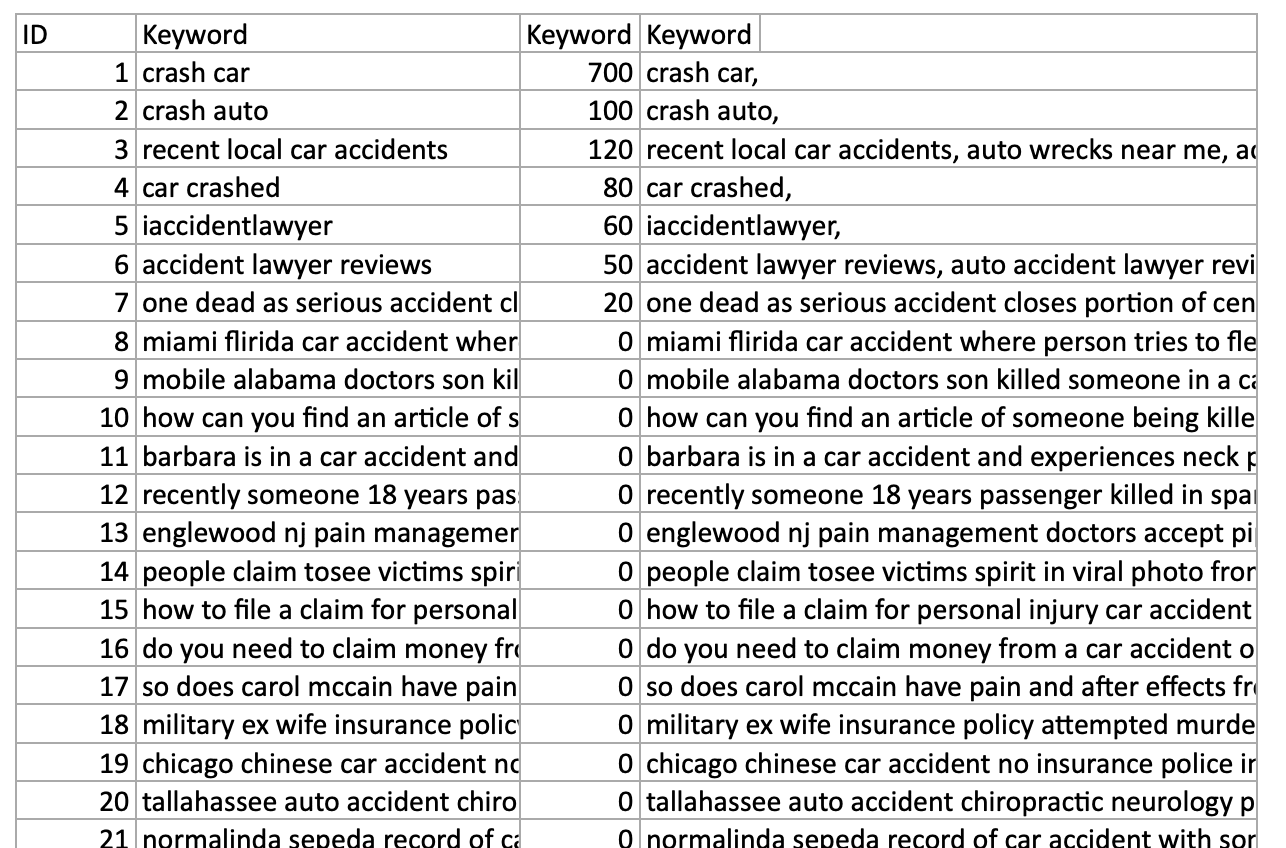
User interface quality
The UI isn’t much of a head turner. After creating an account, this is what the dashboard looks like.
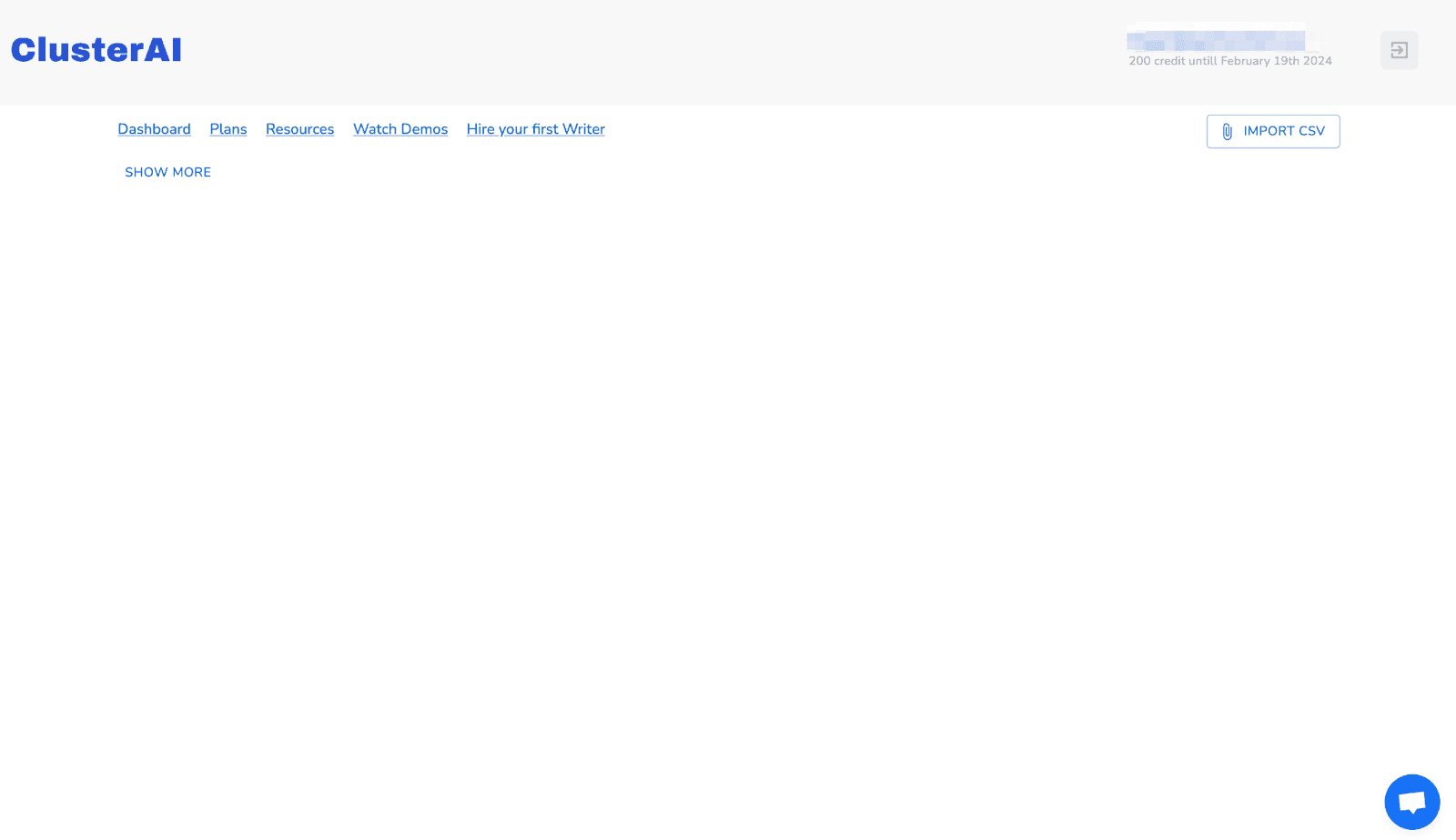
Uploading only 63 keywords took several minutes. The progress bar was also stuck at 97% for quite some time. The site isn’t very intuitive, and there also aren’t many features and integrations on it either.
Price
You can try the tool for free for up to 200 credits (one credit equates to one keyword). After that, there are six options, ranging from $39.00 a month (for 1,000 keywords) to $699.00 a month (for 100,000 keywords). We did the math here, and it appears that the more keywords you want to research, the less it costs per keyword.
Also, the number of available keywords appears to be the only difference between all six plans.
Pros and cons
ClusterAI is…
- Concise.
- Beginner-friendly.
But…
- Its value for money isn’t great.
- Don’t expect a ton of data!
The verdict
Where ClusterAI excels is simplicity. If you want something straightforward and don’t need a ton of data at your disposal, this is a good option. However, what you get (especially considering how much you’re paying for it) could fall short of your needs.
6. Thruuu
With thruuu, you can go from uploading a list of keywords to creating SEO briefs in no time. It automatically groups your keywords based on their search intent, analyzes data from top-ranking pages, and uses insights from these clusters to create ready-to-use SEO briefs.
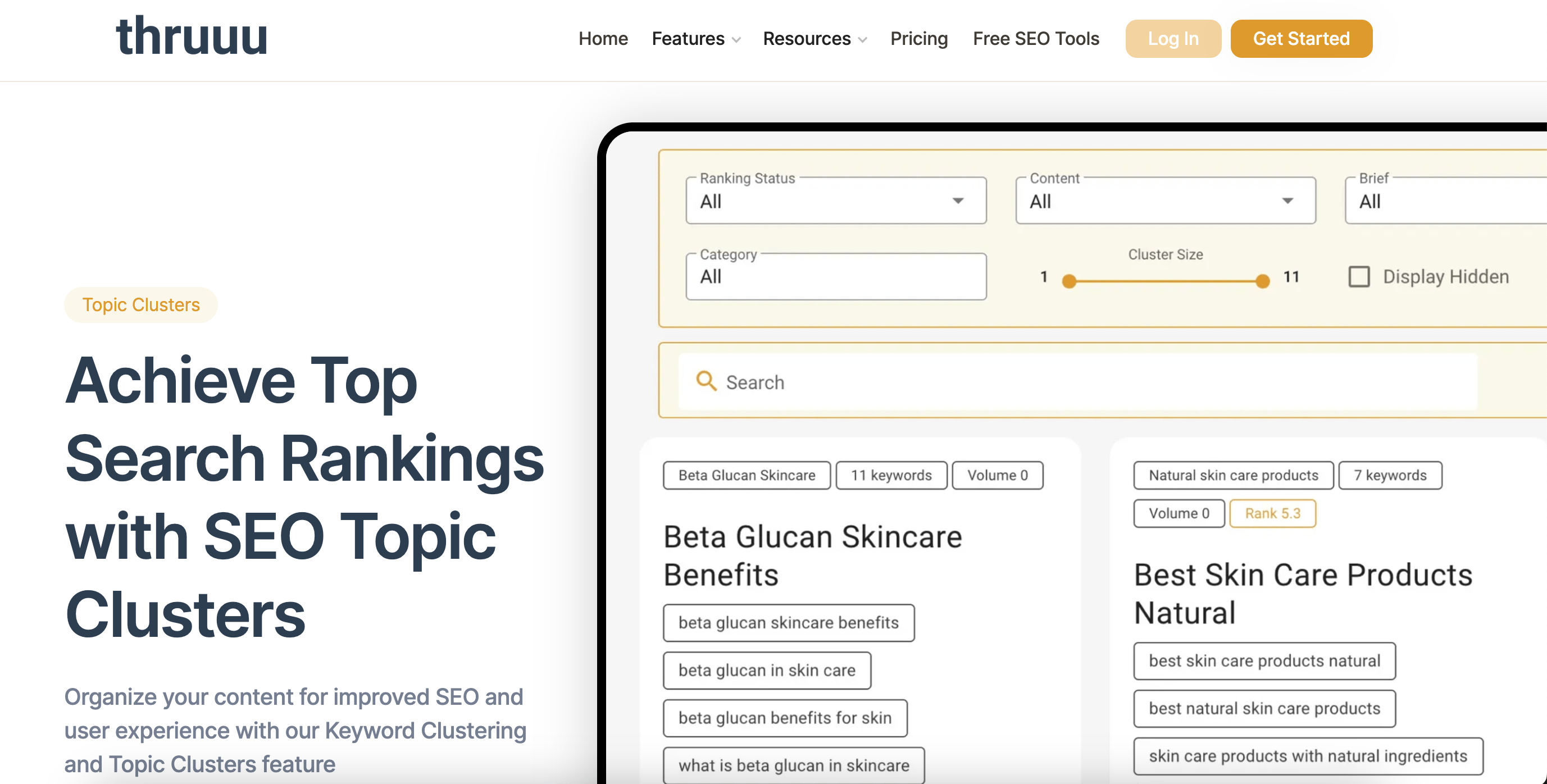
Efficient keyword segmentation
After you upload your list of keywords to the platform, Thruuu will use data from Google to automatically group keywords together based on their search intent.
Different grouping options
Similar to the other tools on this list, you can group keywords by geographic location, search engine, language, and device (desktop vs mobile).
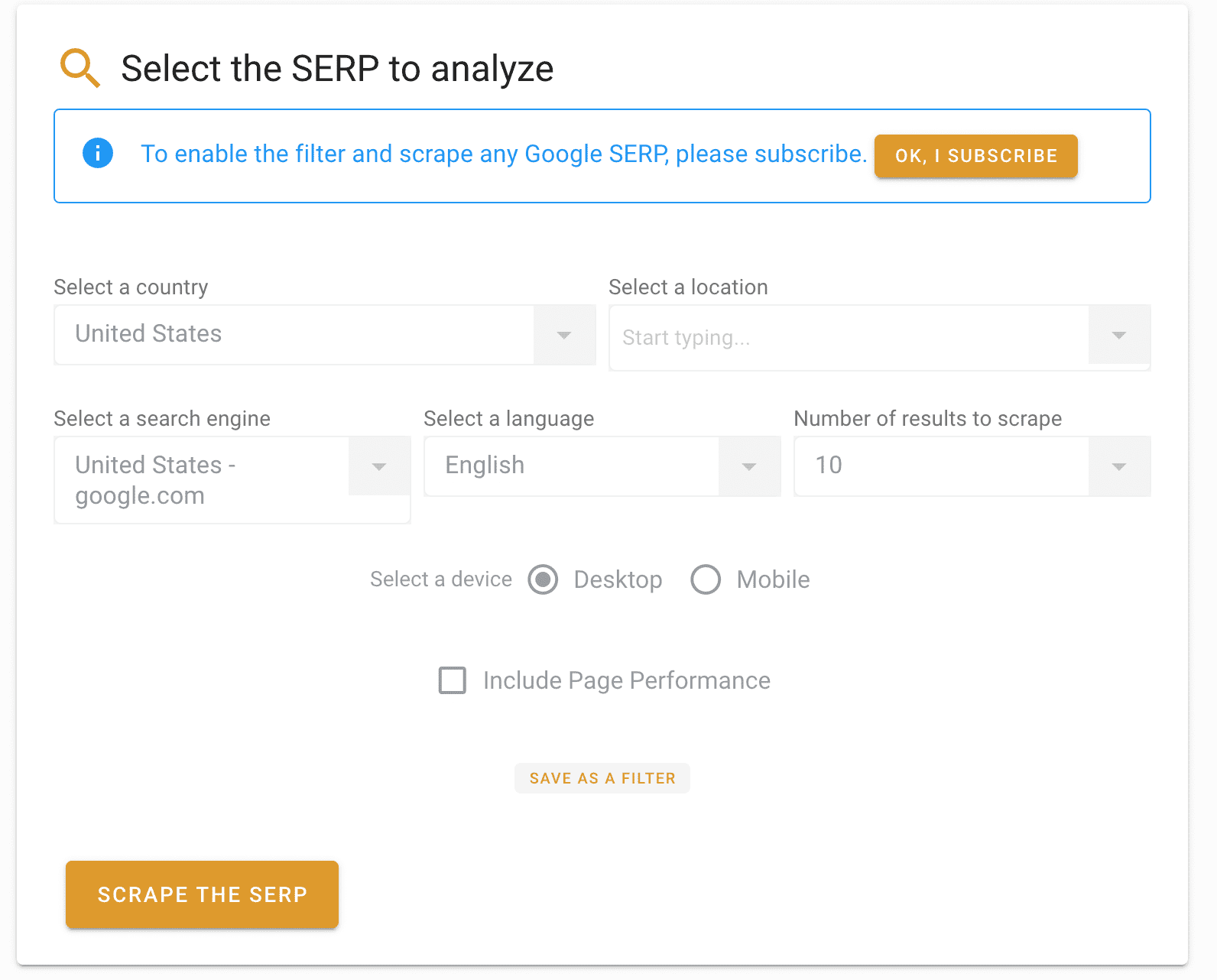
Availability of search volume
Get a comprehensive view of the data around your keywords and clusters, including search volume, the word count of ranking pages, and the image count.
User interface quality
Thruuu has a sleek and simple (but fairly detailed) UI, helping you to keep the content creation process clean and straightforward. It’s easy to navigate between competitor information, questions from the “People also ask” feature in Google, and other options. The tool also makes it easy to create pages for both pillar and cluster content.
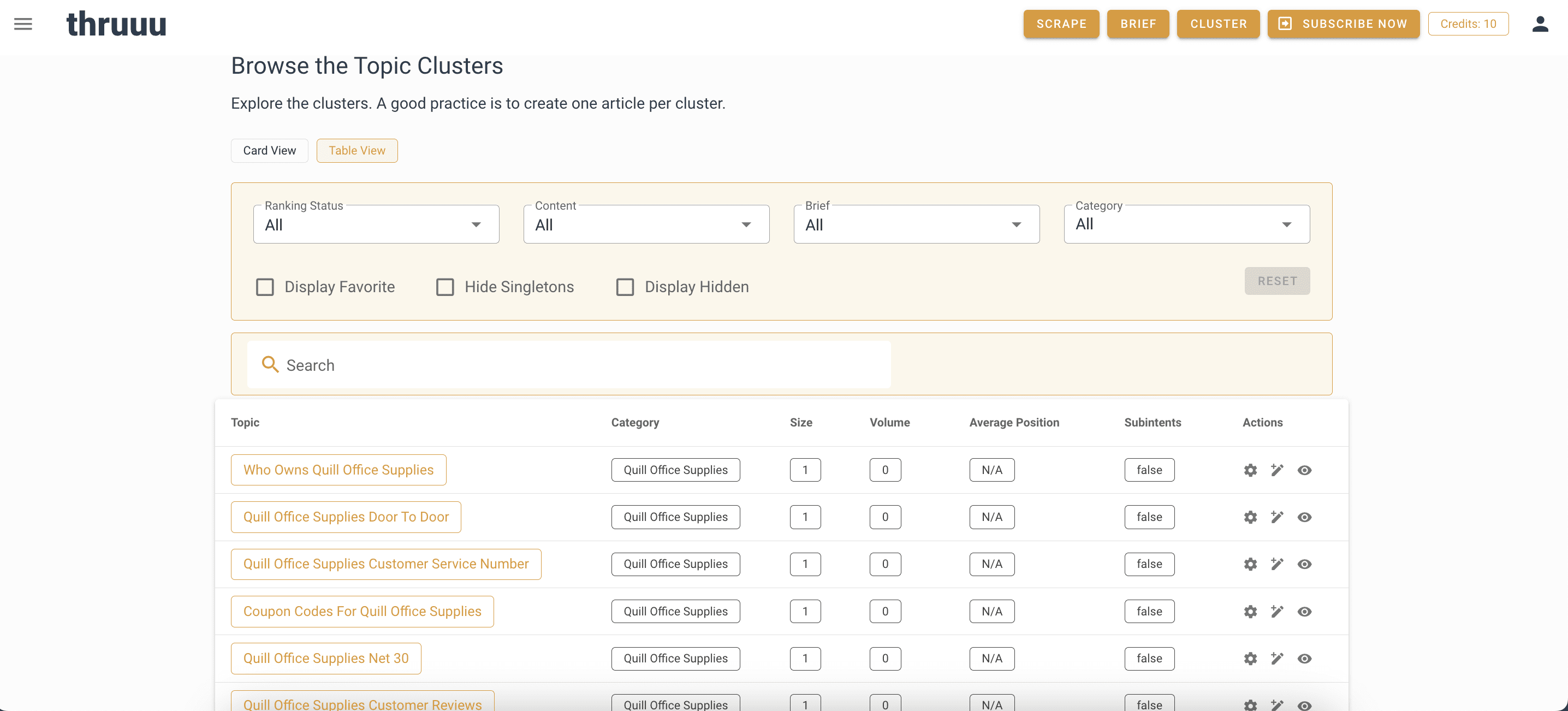
Price
You can take it for a test drive with 500 free credits. It also comes with a free version that offers 10 one-time credits (keyword clustering is part of that). The purchasable plans range from $19 a month to $99 a month. By paying extra, you can get more SERP analyses, content briefs, and keyword clusters.
Pros and cons
Thruuu is…
- Good for beginners.
- Mostly affordable.
But…
- It’s features and data are mediocre.
The verdict
Thruuu is very middle-of-the-road. You get what you need at a decent price, but not much more. The UI is beginner-friendly, and you’ll get some pretty useful insights. It’s not the most sophisticated tool, but it’ll get the job done.
7. Surfer
Surfer has turned SEO into a game, and with the help of its Keyword Research Tool, keyword clustering is not only manageable but fun.
Efficient keyword segmentation
Surfer uses your primary keywords to build out cluster topics. This aids in the creation of relevant and related content, which will help you rank for competitive keywords and bring in plenty of organic traffic.
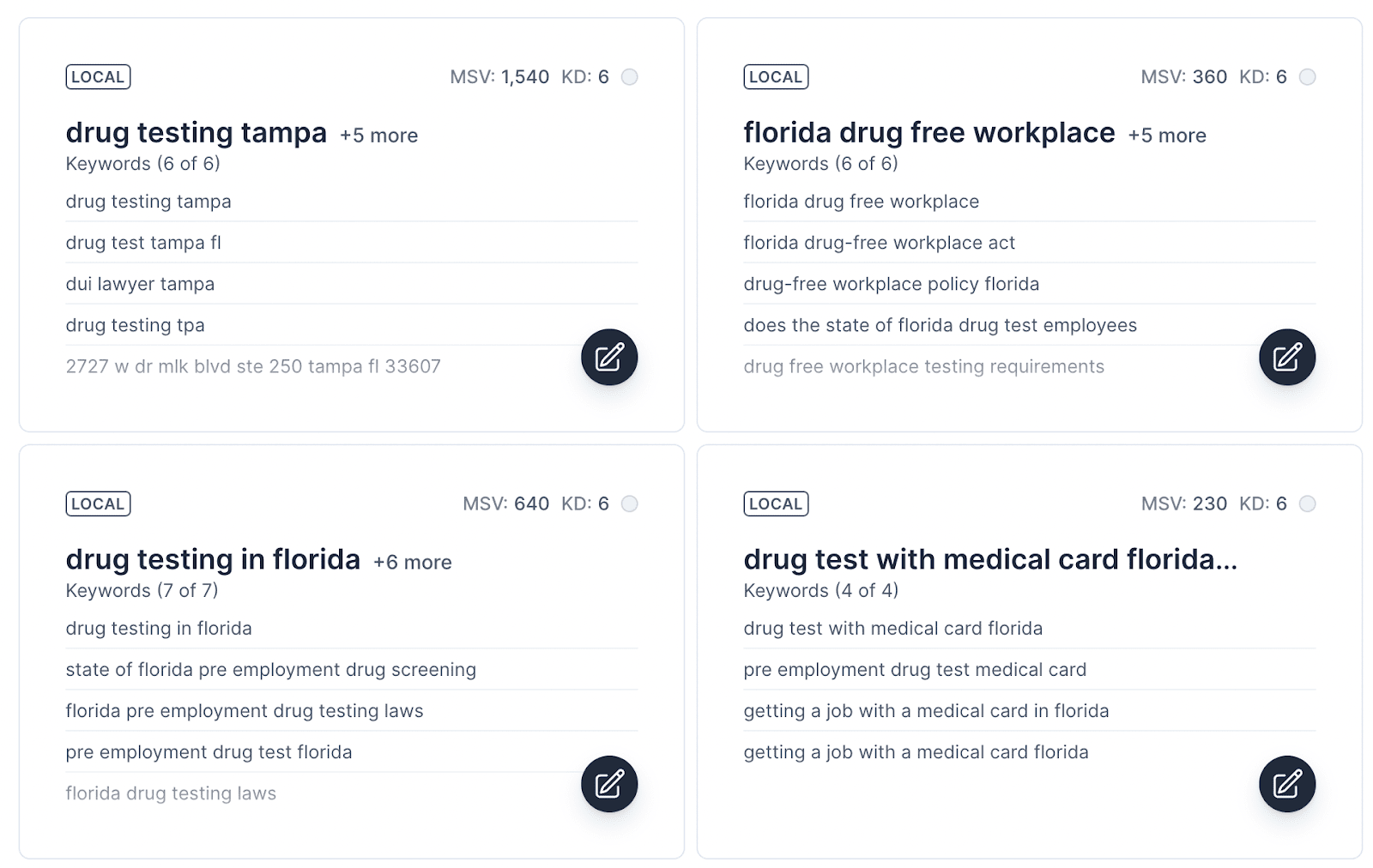
What’s neat is that if your primary keyword is too broad, Surfer will automatically create several topic clusters.
Different grouping options
You can group results by intent (i.e. local keywords, customer investigations, information terms, and shopping-related terms). You can also choose the country and language.
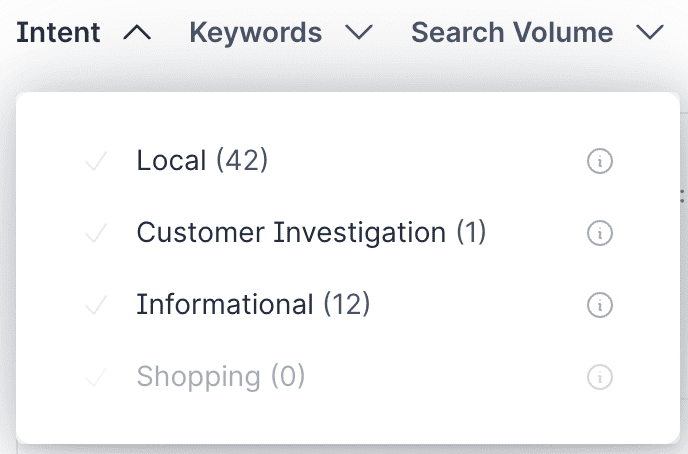
Availability of search volume
Each cluster contains a small number of relevant target keywords next to their predicted monthly search volume, keyword difficulty, and projected total traffic. Additionally, you can sift through your keywords based on search volume ranges.
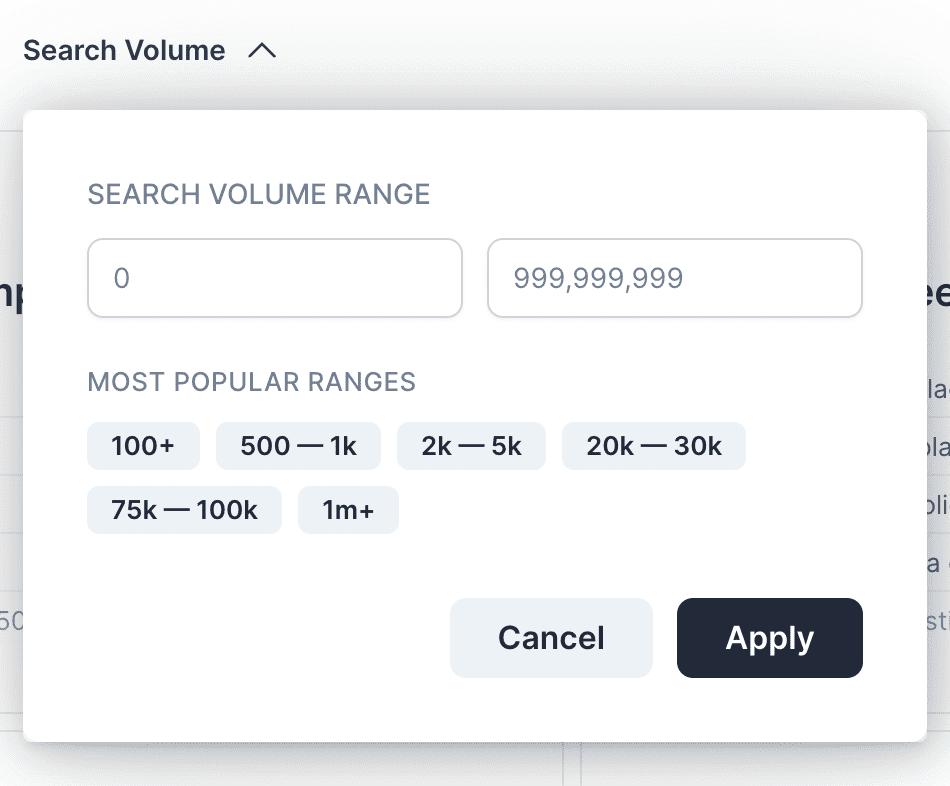
User interface quality
Surfer’s user interface is intuitive, engaging, and interactive. Even if you’re new to SEO and keyword research, this platform makes it easy to find your way around.
One of the drawbacks of Surfer is that there are no significant customization options. What you see is what you get!
Price
Here’s the bad news: Surfer isn’t cheap. The Start plan begins at $59. It does include keyword research (100 searches per day), but you’ll have to upgrade if you’re looking for a more comprehensive SEO tool. However, even if you choose a broader subscription plan, the keyword research limits remain the same. The next two plans are $129 a month and $219 a month, respectively. There’s also an Enterprise plan, but you’ll need to contact the sales team to get a custom quote.
Pros and cons
Surfer is…
- Data-driven and packed with helpful insights.
- Fun to use!
But…
- It is expensive. This is one of the biggest complaints.
- Customizations are lacking.
The verdict
Surfer is gaining traction as one of the top players in the SEO industry. But even though it most certainly is a powerful and user-friendly tool, be prepared to pay an arm and a leg for it (with no access to customizations).
8. Zenbrief
Zenbrief creates content briefs that make it easier to write content that appeal to both users and search engines. It also has an editor that lets you create optimized content and audit existing content.
Zenbrief’s keyword clustering tool is free and easy to use. It alllows you to either upload a text file containing your keywords or add them manually.
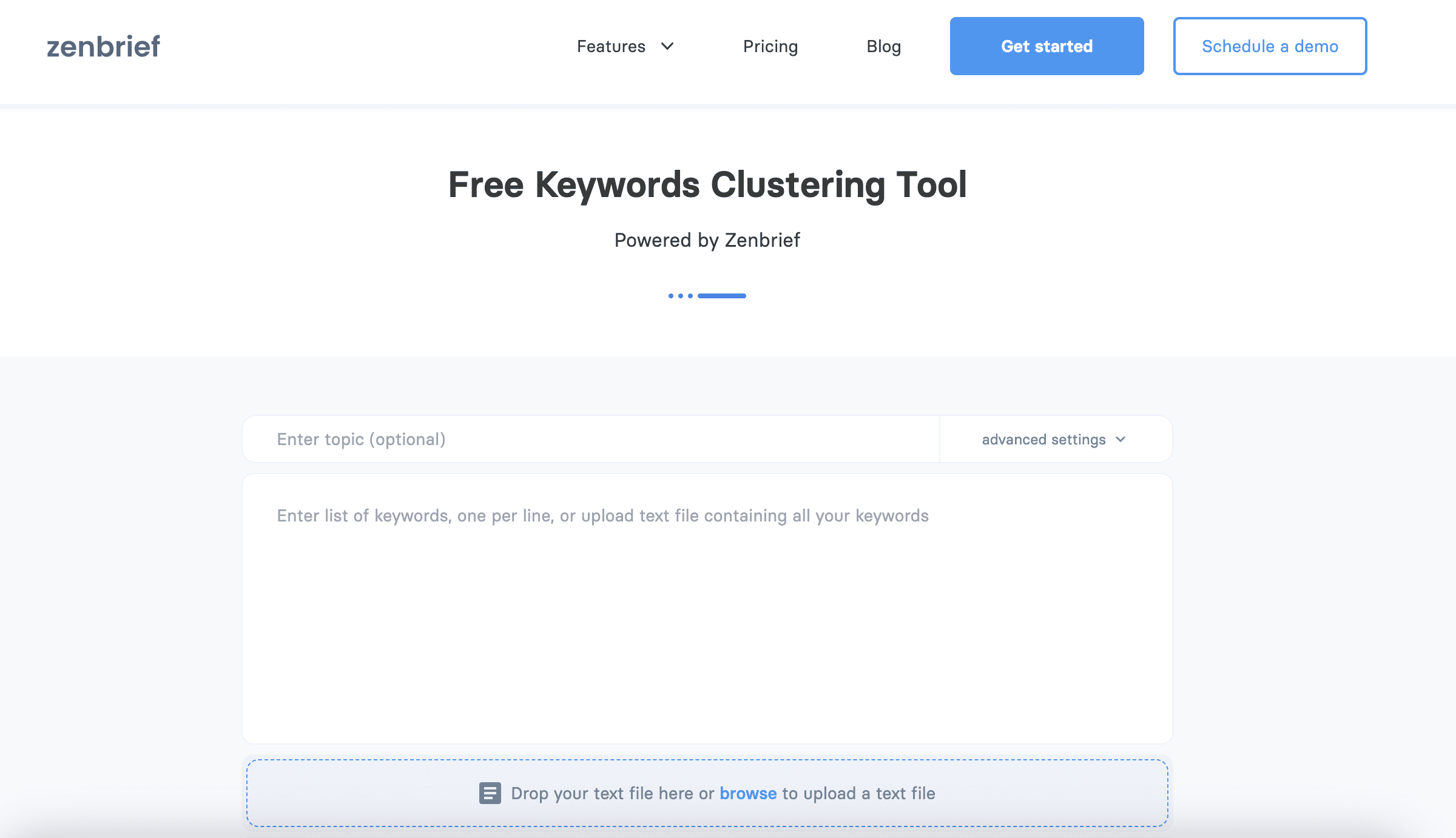
Efficient keyword segmentation
Here is an example involving 58 manually added keywords. Notice how the tool clustered them semantically.
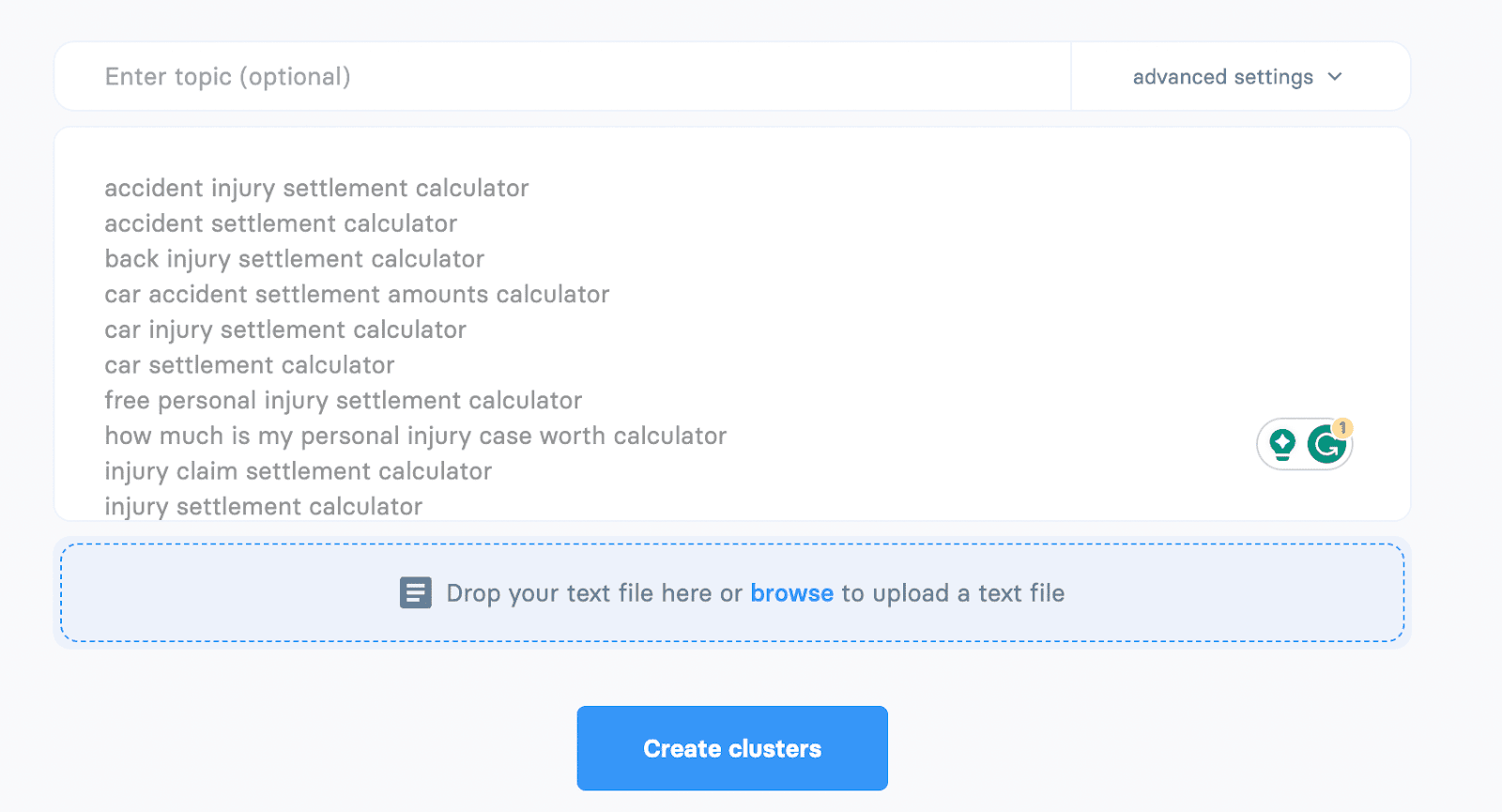
This is what the results look like:
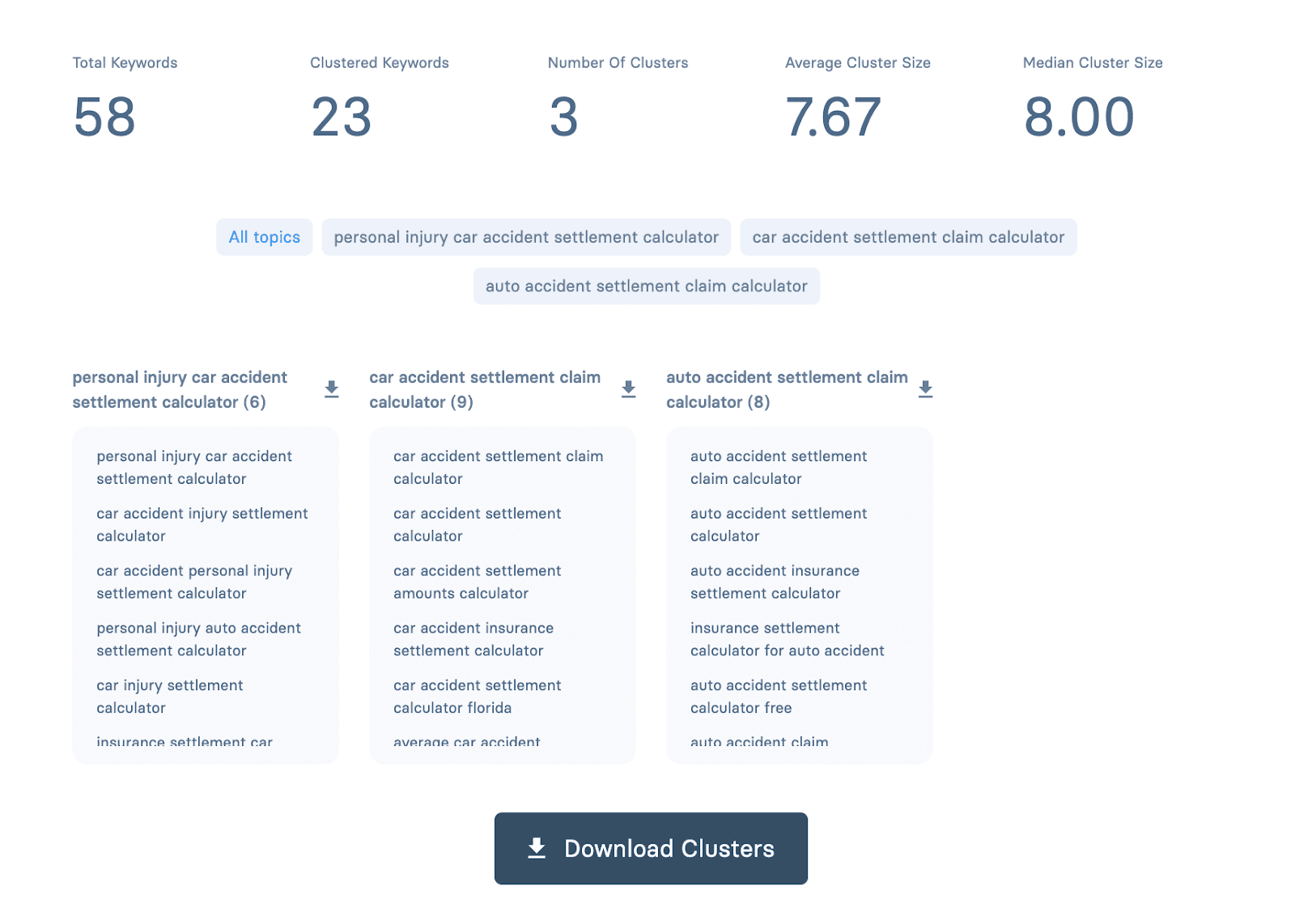
Now, imagine doing this after pulling hundreds or thousands of keywords from your go-to SEO/keyword suggestion tool. ZenBrief can clearly take much of the heavy lifting off your plate.
Different grouping options
ZenBrief doesn’t appear to have any grouping options available.
Availability of search volume
Even after downloading the results, there is no search volume (or other metrics) displayed.

This suggests that, prior to entering your keywords in ZenBrief, you’ll have to find this information separately or get it from your preferred SEO tool.
User interface quality
This tool’s user interface is pretty barebones. The only thing you can choose is the minimum and maximum size of the cluster.
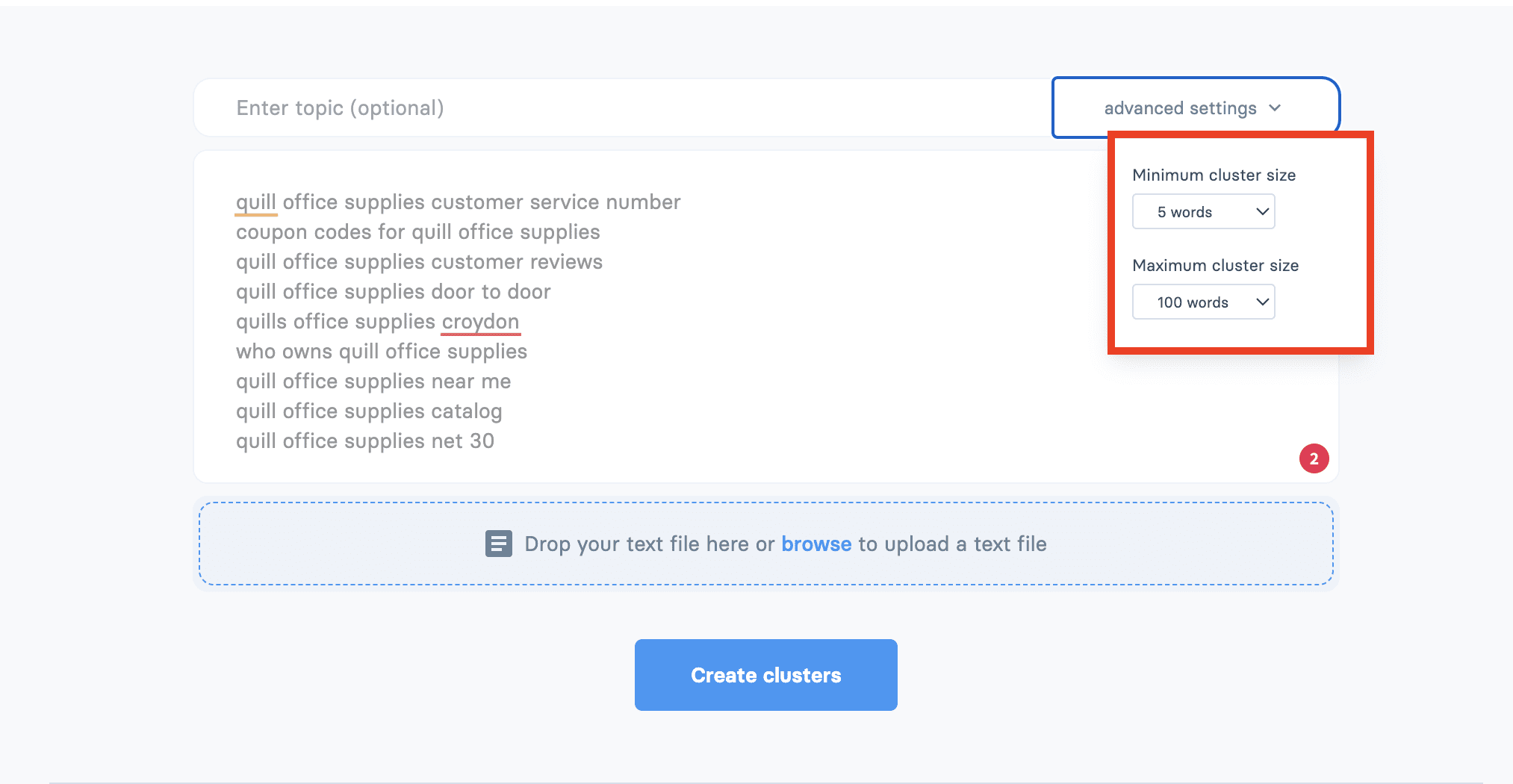
Price
This tool is free!
Pros and cons
ZenBrief’s clustering tool is…
- Great for beginners.
- Free.
But…
- It won’t take you very far.
- You’ll ultimately need to use another tool in addition to, or instead of, this one.
The verdict
If you’re in a rush to get started with keyword clustering, ZenBrief’s free keyword clustering tool might work. There’s no barrier to entry and it does a great job at organizing larges volumes of keywords. But because of its lack of features, customizations, and metrics, ZenBrief won’t get you very far in your SEO journey.
Wrapping up
So, which tool should you choose? The choice is yours! It all depends on your needs, budget, and your level of SEO expertise. If you’re new to SEO, starting with a free tool might be your best bet. But if you’re a more seasoned SEO professional who values efficiency and accuracy, we recommend SE Ranking.
Considering these various platforms based on the criteria above, SE Ranking emerges as the best keyword grouper tool, excelling in both value and performance. It can cluster thousands of keywords in a flash and organize your topic ideas into cohesive and relevant pillars.

